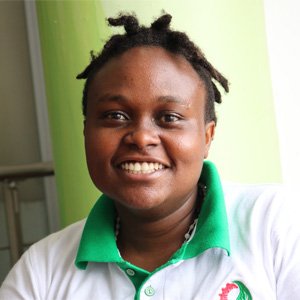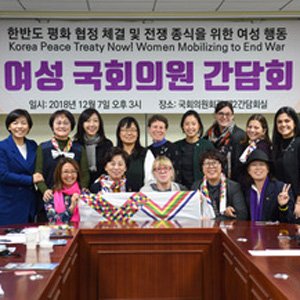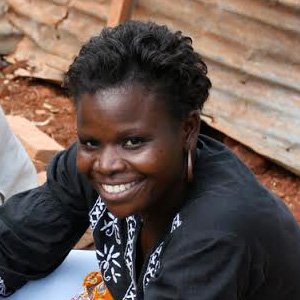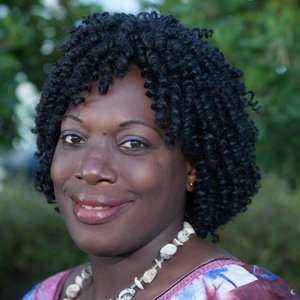2019
THE WOMEN HAVE WINGS AWARDS
Cristina Palabay
Philippines
Cristina Palabay is a committed activist and feminist. Over the years, she has consistently stood in defense of human rights, and fundamental freedoms. Fearlessly, she has raised issues of State accountability against human rights violations, and their impact particularly on women that have been committed by different administrations of the government of the Philippines.
In her current capacity as Secretary General of Karapatan, she has been at the forefront of raising concerns against the extrajudicial killings committed by the Duterte administration not only in relation to its “war on drugs”, but also in the context of its insidious persecution of women and other human rights defenders in the country. She has issued press statements, spoken in public fora, mobilized protests, lobbied regional and international human rights bodies to denounce the human rights violations committed by the Duterte administration. Because of her courage to stand up for justice and human rights, she “received on 22 April 2019 a text message from an unidentified person warning her and several others that they are targeted to be killed this year.”
In spite of the risk she faced in her life, Cristina has continued unabated in her activism to hold the government accountable. This July 2019, she attended the 41st session of the Human Rights Council in Geneva, Switzerland to address the body regarding the extrajudicial killings, and other human rights violations committed by the Philippine government. Cristina has been instrumental in founding Tanggol Bayi, a national network of women human rights defenders.
Peggy Mativo Ochola
Kenya
Peggy Mativo Ochola was raised in a family that believed in the power and importance of education and that voluntary service work was something in which to engage as one way to give back to community and society. She excelled at school, which eventually resulted in her winning a prestigious Zawadi Africa scholarship and attended Harvard earning degrees in Chemistry and East Asian Studies. Her volunteer work with overcrowded and under-resourced schools in rural Tanzania catalyzed her thinking as a social entrepreneur and led to her founding PACEMaker International in 2013 in Nairobi, Kenya.
This all led to the creation of PACE’s vision which is to work with others to create a Kenya where access to high quality education is the norm for all children, and where youth are empowered to lead productive change in their local communities. Peggy’s innovative idea was to implement this by recruiting recent high school graduates to volunteer in public schools as teaching assistants during what is essentially a built-in gap period of 6-9 months for those going onto university (or into employment). This solution is a win-win for the volunteers and for students (and their teachers). The youth receive valuable training, mentoring and experience including specific development in interpersonal skills, critical thinking, entrepreneurship and job readiness that help them to succeed in university and earn a living. The children and their teachers benefit from support in such areas as grading, tutoring, language instruction. More specifically the children attending these under-resourced classrooms get critical one-to-one support and are encouraged to engage in a range of other projects that help to improve their school environment and as well as after school activities and clubs. The tracking of both children’s academic progress and Fellows’ confidence and skills (organizational, communication, problem-solving and others) is showing exciting and very positive results. Interest and demand from schools and youth to participate in PACE has grown every year.
Since PACE was founded they have been tracking progress and evaluating what is happening – they have early evidence of their impact in schools: happier pupils, better academic scores and youth who continue to lead social impact initiatives in their communities after leaving the PACE program. Some alumni have gone on to pursue teaching as a profession and essentially all continue on to higher education at universities in Kenya, the African region and beyond. The brilliant idea of truly creating an ever-growing cadre of thoughtful, action oriented and entrepreneurial youth in Kenya is just now showing the potential of this as a multiplier effect for positive change locally. PACE’s work directly aligns with some of the new changes in the Kenyan curriculum and attention to creating service-oriented programs for youth.
Nzambi Matee
Kenya
Nzambi Matee is the founder of Gjenge Makers, a social enterprises with the aim to tackle waste pollution by collecting plastics (primarily water bottles) from households and institutions and converting the waste into paving and building blocks for construction. Nzambi is a trained engineer and schooled in biochemistry. The years following her college graduation has been working in a corporate environment, a proud achievement for both her family and her community. Although successful in her line of work, Nzambi saw an immense opportunity to address a need for reliable building products, alongside a greater need to reduce plastic waste in her community. She melted the two together and formed an enterprise addressing one of the greatest challenges facing her community: pollution and waste. The government works closely with Nzambi to provide her with all their plastic waste and recognizes the mutual benefits.
Saliwe Mutetwa
Zimbabwe
Zimbabwe is a jewel in Southern Africa. Once dubbed the ‘bread basket of Africa’, Zimbabwe has been degraded through years of misrule, corruption and economic instability. The unemployment rate has reached an alarming 94 percent and a significant proportion of the population lives below the poverty datum line. Sadly, women, girls and youth are most affected. They lack access to activities and resources to contribute to economic success and security – they have reduced access to livelihood opportunities and reduced access to basic services such as health, family planning and education. Women and girls have low educational attainment, most dropping out of school due to gender-related circumstances such as the need to care for sick family members, pressure to marry and unexpected pregnancies. Most women marry young for survival and are victims of intimate partner violence, resulting in high divorce rates.
Saliwe Mutetwa is driven by a personal vision for women, girls and youth to attain the freedom to experience wholeness in terms of health, education and enterprise opportunities. She courageously established Talia Women’s Network after going through a personal ‘dungeon’ phase where both she and her husband were unemployed, lived with no access to water and electricity, and did not know where the next meal would come from. Meaning ‘dew from heaven’, Talia exists to provide sustenance for women, girls and youth, offering integrated socio-economic and health support. In a country facing widespread socio-economic decay, Saliwe has garnered support from influential leaders within the private sector, government and NGOs to equip vulnerable women, girls and youth with life skills to harness economic and social opportunities, inspire change and bring transformation to their lives and communities. Saliwe is working in rural communities to provide educational and leadership development programs; economic empowerment and livelihood opportunities; and access to sexual reproductive health and rights information and services. The impact of her work has been resilient individuals who actively participate in creating peaceful, inclusive and sustainable communities.
Korea Peace Now!
South Korea
The Korean Women’s Association United, Women Making Peace, National YWCA of Korea and Korea Women’s Alliance undertook great efforts to unite their voices and officially launched their coalition, Korean Women’s Movement for Peace and launched the Korea Peace Now! campaign on May 24th, the International Women’s Day for Peace and Disarmament, to at last achieve a peace treaty, end a 70 year old war that has caused countless deaths, injury, destruction and left divided families and began the most heavily militarized place on earth, the DMZ, and, as Eisenhower noted, launched ‘the military-industrial complex.’ This alliance is the product of tireless efforts from its members, in a dangerous and complex context of US-North Korea relations, and is a testament to their courageous and powerful commitment to peace on the Korean Peninsula. Although South Korea is among the most vibrant democracies in Asia and around the world, the National Security Law which was put into place to quash progressive voices, has been used to redbait pro-peace voices and activists. While the political space has considerably opened up in the era of President Moon, a decade before of conservative regimes repressed the pro-peace and reunification movements, including the KWMP, many of whom were fined and threatened with imprisonment for meeting North Korean counterparts in neutral third-party countries. Their resistance and resilience in the face so much of government repression definitely contributed to the growing tide during the candlelight revolution which led to the conservative Park Geun-hye’s impeachment and the sweeping in of President Moon on a pro-peace and engagement platform. The coalition brings together the grassroots voices of Korean women to advocate for peace, gender equality, and a world without war. They are developing an agenda for public governance with specific goals such as disarmament, demilitarization, humanitarianism, reconciliation, healing, welfare, internal integration and coexistence in the peace process on the Korean Peninsula through women’s solidarity. In addition, they are strengthening the leadership of women peace activists, and building a peace culture (through the Northeast Asian Women’s Peace Conference in the Korean Peninsula and Northeast Asia.)
These visionary women have not hesitated to make courageous calls for humanitarian assistance to North Korea to address chronic food shortages – free from U.S. constraints and influence - at a time when it is risky and controversial for the government to do so without aligning closely with the Trump administration. They have been instrumental in breaking the war narrative in the Korean Peninsula, broadening the vision of peace beyond national borders, and building bridges between women in Seoul, Pyongyang and Tokyo who would never have been together in the previous years. Despite years of threats, harassment and accusations of violating security laws while working for peace, they immediately seized the window of democratic political space that opened to make the most of it, without fear of consequences should it turn out to be short-lived. It is for this reason we believe they are worthy of the Women Have Wings Award. It may seem odd that we nominate a relatively new coalition, but it is their strategic foresight and creativity, their persistent, commitment to peace in the face of the context described above, which led them to come together in new ways to seize the opportunity to build a new global women-led movement for peace on the Korean Peninsula that inspires us. While they are building on previous efforts of feminist peacebuilding of their members and others, they are committed to truly movement building in new innovative ways, and it is not an individual but the collective movement that also inspires.
Farida N. Bedwei
Ghana
Farida N. Bedwei is an entrepreneur and a disability rights advocate who has won many awards for her advocacy. She was diagnosed with Cerebral Palsy at age one (1), but hasn’t let that deter her from her ambitions in the tech industry. Her company, Logiciel, is currently the leading provider of microfinance banking solutions in Ghana and she was voted the most influential woman in finance, in 2013 for her work in promoting financial inclusion. On the disability front, she is an Executive Committee member of Sharecare Ghana (a support and advocacy organization for people with autoimmune and neurological conditions), and she is currently the chairperson of the Resource Mobilization committee, under the Ghana Federation of the disabled. She is also the author of a comic series, Karmzah – which features the first superheroine with Cerebral Palsy. Farida’s story and defiance of the limitations and stereotypes placed on people living with disability extends beyond inspiring to contagious courage that continues to motivate people all over the world. Her story has been shared on major platforms thereby helping to demystify disability internationally. She has been featured on BBC Africa (TV and Radio) as well as DW Radio and many other local programs in Ghana. In February 2015, she was featured on CNN African Voices. Furthermore, in March 2016, she was appointed as a Young Global Leader by the World Economic Forum.
Farida lives by the motto that: “We as Africans are the only ones who can solve our own problems, because we are the only ones who understand the cultural, religious and economic reasons why we are in this current situation.” She explains further that as an entrepreneur, her slogan, using technology to transform lives, doesn’t mean changing who we are, but rather using technology to enhance the way we do things.
Rose Wamalwa
Kenya
Rose Wamalwa tells her story here. Rose was born in a rural area in Kenya and, like most girls in her village, she spent her childhood walking long distances to fetch water. She dreamed about growing up and doing something about this problem that risked the lives and limited the potential of so many women and girls in her region. Rose grew up and did just that. After completing University, she knew she wanted to build her leadership in this field, which is why she applied to be a fellow in our women and water program. During this year, she learned leadership development, WASH education, water testing, action planning and hands-on construction of toilets, rainwater harvesting systems, and water treatments. Rose then became a trainer in the program, working with grassroots women’s teams to provide support in planning, development and implementation of technologies and water projects in their communities in Kenya and Tanzania. She taught these emerging women leaders to build technologies, plan holistic strategies, and design sustainable projects.
In 2012, Rose stepped out on her own to start a community based NGO – Women in Water and Natural Resources Conservation (WWANC) – so that she could reach more women, not just in Kenya, but in Uganda and Tanzania. She runs programming in each of these countries, and is recognized as a leader in her field (a field typically dominated by men). Today Rose has built deep experience in community development, social entrepreneurship and transformational leadership for women’s empowerment. She holds a Diploma in Analytical Chemistry, a Bachelor’s degree in Biological sciences, and is currently pursuing Master of Science in Development Studies at Jomo Kenyatta University of Science and Technology in Kenya. Rose is a Trainer, A certified Enterprise Development Agent by UNDP Kenya, a WASH advocate, a climate protection champion and an environmental activist.
The best part of Rose’s story is the ripple effect of her work, for now her daughter holds a big vision for her own leadership, sharing that when she grows up, she wants to be just like Rose.
Sophie Ngassa
Cameroon
Sophie Ngassa has been actively involved with World Pulse for almost five years, and has written many posts for the site. Notably, as the horrific conflict has increased in Cameroon, Ms. Ngassa has been a fearless leader working to unify Anglophone and Francophone women in Cameroon through a shared vision for peace through digital storytelling. Despite unthinkable danger, Ms. Ngassa was able to safely unite more than 200 women in a shared campaign calling for peace during this year’s International Women’s Day.
She is leading a “Digitally Empower Girls in STEM” campaign, where she plans to impact 2,000 girls in the next 2 years. In 2010 she created the Center for Youth Education and Economic Development, where she run programs to train and mentor girls in basic programming and other digital skills. She also serves as a World Pulse “Ambassador”, and has been selected as a “Featured Changemaker”, which is an honor that is awarded through a selection process to active members who are spearheading campaigns that are making an impact on their communities and the world.
Cristina Ávila-Zesatti
Mexico
Being a journalist in Mexico is like walking around with a target on your back. For years the country has ranked one of the most dangerous for reporters. Collusion between officials and organized crime makes the country, while not at war, even more dangerous than some war-torn nations.
Cristina Ávila-Zesatti has had a long and successful career as a journalist, working for major news organizations such as CNN, NBC and Telemundo International. She left those news organizations ten years ago, not to seek a lower profile or safer career, but to dedicate her career fully to “peace journalism.” She founded an organization, Corresponsal de Paz, dedicated to increasing coverage of solutions to violence, positive social changes and the world’s peacemakers. In 2015, she published The Peace that Does Exist but Journalism Ignores, her second book. She is determined and courageous. And she believes in giving back.
Cristina has belonged to the World Pulse community since the very beginning. Ten years ago, in 2009, when this wonderful women’s project began, she was chosen as an emerging voice. In that same year, Corresponsal de Paz was also born. Since then, this peaceful and journalistic initiative has been her life, her passion. During the past decade, as World Pulse has grown, we have seen Cristina grow up with this community of women from all around the world. She says, that these two projects are her “online home sweet home: the places where my mind is fed with other minds and my heart beats happiness thanks to other visions and hearts.”
Cristina also says, “Without any doubt, being a voice and raise others women voices is the best way to build world’s peace. That is the meaning to be World Pulse Ambassador, because after 10 years walking this path together means to be able to offer my experience and my love to the dreams of other women who are today as I once was in the past: searching for listeners and completely convinced that my dream was worth and valuable, and deserved to become truth and be part of our reality. As Mahatma Gandhi said once: “If non-violence is the law of our being, the future is with women.” So, both World Pulse and Peace Correspondent websites are aligned in their visions, and I am truly honored to share this huge and beautiful responsibility to be here as a peace journalist who still dreaming that women’s dreams and women voice is the narrative that our entire world needs to hear, to respect and to follow up.”









